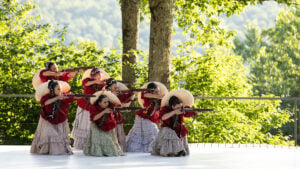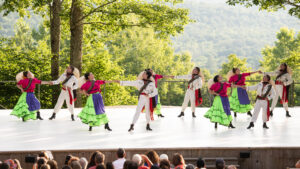On July 13th, 2022, Ballet Nepantla made its Jacob’s Pillow debut on the Henry J. Leir Outdoor Stage with an excerpt of their original work Valentina. Ballet Nepantla featured many stories from revolutionary Mexico that exalted women’s strength, power, and determination during war times. In doing so, they brought an electrifying performance full of heartfelt corridos, colorful traditional Mexican folklorico, stylized contemporary ballet, and exceptional artistry to our stage. We sat down with Andrea Guajardo to gain insight into the founding of Ballet Nepantla and the process of creating Valentina.
Ballet Nepantla was founded in 2017 by Andrea Guajardo and Martín Rodríguez with the idea to fuse dance styles. Having ample experience in their respective dance fields, Andrea Guajardo, a contemporary ballet dancer, and Martín Rodríguez, described by his counterpart as a master of ballet folklorico, took a leap of faith in founding Ballet Nepantla, trusting in each other’s artistry to create a dance company whose mission is to celebrate and amplify Mexican heritage.
Inspired by the mission of creating a dance company that represents the founders’ Latinx identity, the word Nepantla came into the conversation. Andrea Guajardo recounts having trouble finding a name that could encompass the complexities of the work she and Martin were embarking on. Nepantla, a word of Nahuatl origin meaning “in between-ness”, became synonymous with the company’s mission and a nod to the experiences of transculturalism Andrea, Martín, and their dancers share.
Audiences at Jacob’s Pillow can attest that the company has succeeded in its mission of melding contemporary ballet and traditional Mexican folklorico. Andrea Guajardo enlightened us about the inception and creative process of pieces within the programming.

Valentina is a period piece specific to the Adelitas, women from Mexico’s revolutionary time who took arms and fought in the war. The Adelitas, a famous Mexican folktale, were named after a real woman named Adelita who lived during this period. As the founder of Ballet Nepantla described, the word Adelitas is representative of women who cooked, cleaned, and took care of their husbands during war times adhering to the expected roles of women, who then after death and devastation set in dedicated their livelihoods to defending their families, land, and people.

The Adelitas however, are not the only stories of women leading within Mexican revolutionary times, La Chamuscada, Juana Gallo, and Las Coronelas are only some examples of female resistance and power that have also been immortalized within traditional Mexican folktales. These stories are highlighted within Ballet Nepantla’s Valentina.
Andrea Guajardo explains that Valentina at the early stages of its development was only supposed to be a few pieces long, however, during her research the stories of women fighters and leaders kept appearing. Inspired by these stories, and determined to create a show that highlights the strength of women, Valentina became a full-length show and a rotating piece of repertoire.

A company created on the idea of celebrating Mexican heritage, it is no surprise that identity plays a big part in the collective artmaking experience of Ballet Nepantla. Andrea Guajardo assures that Ballet Nepantla is the “…first time I have felt completely represented in art…Ballet Nepantla allowed me to explore my identity fully”.
The importance of Valentina lies in exemplifying the strength of women and bringing the stories of women of color to the forefront of art. Andrea Guajardo explains that it is important for young women to see themselves represented in powerful ways and that this notion drove her inspiration for Valentina.
Written by Lourdes Del Mar Santiago Lebrón. Published July 2022.